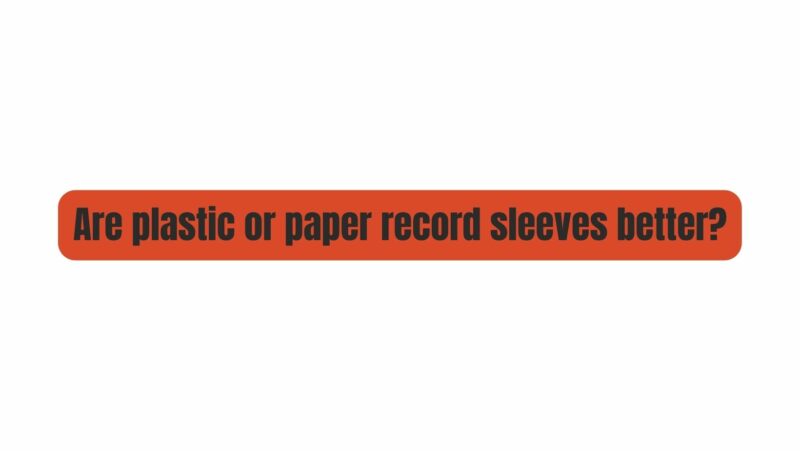The world of vinyl records has seen a remarkable resurgence in recent years, with audiophiles and music lovers alike embracing the warm, analog sound of vinyl. As vinyl enthusiasts dive deeper into this classic medium, they often find themselves faced with choices beyond just selecting their favorite music. One such choice is deciding between plastic and paper record sleeves for protecting and preserving their beloved vinyl records. In this article, we will explore the pros and cons of both plastic and paper record sleeves, delving into the factors that make one a better choice than the other.
- The Role of Record Sleeves
Before we delve into the plastic vs. paper debate, it’s essential to understand the critical role that record sleeves play in the preservation of vinyl records. The primary purpose of a record sleeve is to protect the vinyl from dust, dirt, scratches, and other potential hazards that can degrade the sound quality and overall condition of the record. Record sleeves also serve as a means of storing and organizing your vinyl collection.
- Plastic Record Sleeves
Plastic record sleeves are a popular choice among vinyl collectors, and for several good reasons.
2.1. Durability
One of the most significant advantages of plastic record sleeves is their durability. Made from polyethylene or polypropylene, these sleeves are resistant to wear and tear, making them an excellent choice for long-term protection. They are less prone to tearing or splitting, ensuring that your vinyl records stay in pristine condition.
2.2. Clarity
Plastic sleeves offer excellent clarity, allowing you to showcase the album cover art without distortion. This is particularly important for collectors who appreciate the aesthetic value of vinyl records and want to display them proudly.
2.3. Anti-static Properties
Many plastic record sleeves come with anti-static properties. This feature helps reduce static electricity, which can attract dust and negatively impact the sound quality of your vinyl. Anti-static sleeves can minimize pops and crackles during playback.
2.4. Variety of Options
Plastic record sleeves come in various sizes and thicknesses, allowing collectors to choose the most suitable option for their needs. Some sleeves are designed specifically for single LPs, while others can accommodate double LPs or even box sets.
- Paper Record Sleeves
Paper record sleeves, on the other hand, have their own unique set of advantages.
3.1. Vintage Aesthetic
For collectors who appreciate the vintage and retro aesthetics of vinyl records, paper sleeves offer a nostalgic appeal. They harken back to the early days of vinyl, adding a touch of authenticity to the record-collecting experience.
3.2. Breathability
One notable feature of paper sleeves is their breathability. Unlike plastic sleeves, which can trap moisture, paper sleeves allow the record to “breathe.” This can be beneficial in preventing mold and mildew growth, particularly in humid climates.
3.3. Environmentally Friendly
In an era where environmental concerns are paramount, paper sleeves are often considered the more eco-friendly choice. They are typically biodegradable and can be recycled, making them a sustainable option for vinyl collectors who are conscious of their environmental impact.
3.4. Cost-Effective
Paper sleeves are generally more affordable than plastic ones. This can be a significant factor for budget-conscious collectors or those with large vinyl collections.
- Choosing the Right Sleeve for Your Needs
Ultimately, the choice between plastic and paper record sleeves depends on your priorities as a vinyl collector.
4.1. Vinyl Protection
If your primary concern is protecting your vinyl records from scratches, dust, and static, plastic sleeves are the superior choice. Their durability and anti-static properties make them a practical option for preserving the integrity of your collection.
4.2. Aesthetics and Nostalgia
On the other hand, if you’re a vinyl enthusiast who values the vintage charm and aesthetics of the format, paper sleeves might be your preferred option. They can add a nostalgic touch to your collection and evoke the feeling of owning classic records.
4.3. Environmental Considerations
For environmentally conscious collectors, paper sleeves align with sustainable practices and can help reduce the carbon footprint associated with vinyl collecting. Choosing biodegradable and recyclable options can be a responsible choice.
4.4. Budget
If you have a limited budget and need to protect a large vinyl collection, paper sleeves might be the more cost-effective option. They offer protection without breaking the bank.
- The Middle Ground: Hybrid Sleeves
For those who want to combine the benefits of both plastic and paper sleeves, hybrid sleeves offer a compromise. These sleeves typically feature a plastic exterior for durability and an inner paper lining for breathability and protection against static.
- Conclusion
The choice between plastic and paper record sleeves ultimately comes down to your personal preferences, priorities, and the specific needs of your vinyl collection. Both options have their merits, and there is no one-size-fits-all answer.
As a vinyl enthusiast, you have the freedom to mix and match sleeves based on the records in your collection. Perhaps you prefer plastic sleeves for your most cherished and frequently played albums while using paper sleeves for vintage records that deserve a touch of nostalgia.
In the end, the most important thing is to ensure that your vinyl records are adequately protected and that you can enjoy their warm, analog sound for years to come. Whether you choose plastic, paper, or a combination of both, your records will continue to bring joy and musical satisfaction into your life.

